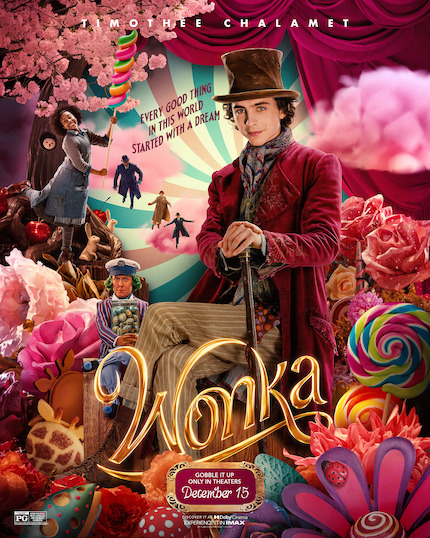WONKA Review: Wonky
Timothée Chalamet stars in director Paul King's musical origin-story.

Wonka (2023) is hard to describe. Not because I don't know what I want to say, but because it feels mean to say it.
My mother did, fabulously, beside me in the movie theatre, in Spanish, thank God, using words I didn't know she knew. A compromise: a crime. Bear in mind that Wonka is directed by Paul King, who you may know from the Paddington movies. This is in the same vein, very much a movie made for children.
The source material, the novel by Roald Dahl, was meant for children. So were the two subsequent movie adaptations, in 1971 and 2005. In all cases, the story revolves around the chocolatier Willy Wonka, who makes fantastic chocolate in the most literal sense.
In this latest movie, there is a kind that can make you fly. This iteration is also particular in that it deviates from the story most commonly associated with Willy Wonka, that of five children at his factory. Wonka is Willy Wonka before he was Wonka. An origin story. An illiterate immigrant who gets fooled into an abusive workplace contract with a laundry shop. A man with a suitcase and a dream. A group of misfits who make no appearance in his later life as we know it.
Willy Wonka (Timothée Chamalet) has lost his mother, and poured his grief and life into making chocolate. After travelling the world for seven years, he arrives at a vaguely European city with the hope of opening the finest chocolate shop. He encounters trouble with the chocolate cartel, a monopoly made of three cartoonish business owners.
A solution arises in Noodle (Calah Lane), a bookish orphan trapped in the same exploitative house he is. The young girl becomes his business partner, and eventually, so does everyone employed under these unfair circumstances.
They sell chocolate militia-style, evading the cartel and the corrupt chief of police (Keegan-Michael Key), until they open a shop. It goes poorly, then it doesn't. Events involving a secret vault under a cathedral, a giraffe, Hugh Grant as an Oompa Loompa (a small man, made British instead of racialized), all take place.
It is a well known-fact that Timothée Chamalet can act. It is unclear how much of Wonka falling flat in delivering the charming insanity previously seen in the character is on him, and how much of it is on the script. Willy Wonka is afforded no humanity except his longing for his mother. Much more compelling, you'll recall, was Johnny Depp's strange gloved hugs with Christopher Lee.
It is, overall, a star-studded cast. Olivia Colman plays the evil laundress, for example. One cannot help but wonder why. The lyrics to the score (have I mentioned this is a musical?) are too on the nose and the humour is a sort of "well, that just happened" Marvel Cinematic Universe shadow. Why is Rowan Atkinson there? In fairness, he had the one funny moment in the film, directing a choir of chocaholic monks. Most of the actors do what they can with the script; Noodle was a bit too much dead-eyed stare.
At this point in late stage capitalism, we are used to reboots, remakes, and sequels. Wonka is the latest victim going the prequel route. It ignores the tone of its predecessors, trying for whimsy over delusion, the result a boring hour and fifty-two minutes.
It also conveniently ignores the most common critique to Willy Wonka's story, the labour conditions of the Oompa Loompas living in his factory, by turning Willy Wonka into one such individual thwarted by the system. Interestingly, it does not shy away from making jokes on people's weight, as evidenced with the chief police officer, growing larger and larger as the film progresses, to the point he cannot exit a car.
The film ends and there is a post-credit scene sung by a dancing, small, orange, Hugh Grant. Do you know what he said about making the movie? "I couldn't have hated the whole thing more." He was talking about the motion-capture process during filming, but it sums up my feelings as well.







